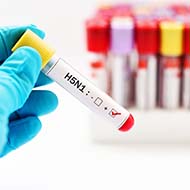Avian flu identified in Wales

"This is further evidence of the need for all keepers of poultry and captive birds to ensure they have the very highest levels of biosecurity in place" - CVO Christianne Glossop.
Avian influenza H5N1 has been confirmed in poultry and wild birds at a premises in Wrexham County Borough, Wales.
The Welsh government confirmed that temporary control zones have been imposed around the infected poultry premises. An investigation is now underway, but dead wild birds found in the area have tested positive for the virus and are believed to be the source of the outbreak.
Avian flu has not been identified in Wales since January when the H5N8 strain of the virus was confirmed in pheasants on Anglesey. The announcement comes less than a week after avian flu was confirmed at a wild bird rescue centre in Worcestershire.
Bird keepers are being encouraged to stay vigilant for signs of the disease and to seek prompt advice from their veterinary surgeon if they have any concerns about the health of their animals.
Chief Veterinary Officer for Wales, Christianne Glossop, said: “Avian Influenza has been found in poultry and wild birds in the Wrexham area. This is further evidence of the need for all keepers of poultry and captive birds to ensure they have the very highest levels of biosecurity in place.
“Public Health Wales has said the risk to the health of the public from Avian Influenza is very low and the Food Standards Agency has made clear it does not pose a food safety risk for UK consumers.”



 The Federation of Independent Veterinary Practices (FIVP) has announced a third season of its podcast, Practice Matters.
The Federation of Independent Veterinary Practices (FIVP) has announced a third season of its podcast, Practice Matters.